
 |
|
|
|
The novel Le Silence de la Mer ("The Silence of the Sea") was an anti-Nazi book published and distributed clandestinely in Paris during the early years of the German occupation. The author was Jean Marcel Bruller; he signed the book "Vercors." A symbol of the Resistance, the book took a defiant literary stance against the occupiers. Its existence proved that France might be militarily overrun but its people were still free and fully aware of what their captors had in mind for them. Translated into English, it was also distributed in the U.K. as an illustration of the French will to resist. When the BBC resumed normal civilian broadcasting in 1946, it is said that a radio presentation of the book was its first official show. 
Le Silence de la mer is a 1949 film adaptation by Jean-Pierre Melville, who would later become famous as a maker of slick crime films and a feature or two about the French Resistance, in which he had been a participant. The patriotic Melville opens his film with turning book pages and an ominous text scroll that doubts that the German nation and its people can ever be forgiven for its war crimes. This is not a forgive-and-forget story. Melville appears to have produced and financed it himself. The narrative is simple. A Frenchman and his niece (Jean-Marie Robain & Nicole Stéphane) are obliged to take in as a boarder a German officer, Werner von Ebrennac (Swiss-born Howard Vernon). The uncle's way of dealing with the unwelcome guest is to not speak to him or acknowledge his presence. Always polite, the officer goes to his room at night and leaves in the morning, but soon begins to speak monologues to his unhappy hosts. A musician, he talks about art and music and the ways that Germany and France will grow together as the occupation turns peaceful. A Francophile, Ebrennac believes that the two countries' future aims are compatible. He describes the relationship as a love affair. The officer eventually visits Paris. He talks informally to other officers and finds that he German intention is to eradicate France as a distinct entity, destroy most of its literature and make it grovel so as never again to pose a military threat to the Reich. Now when the officer talks, his hosts are more sympathetic, even as they remain silent. Ebrennac feels he has reached them but will never know for sure, as he's made a fateful decision. 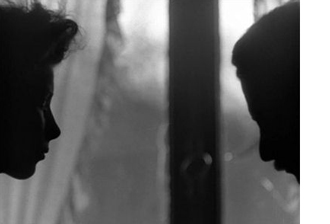
Le Silence de la mer is an impressive first film and indicative of Jean-Pierre Melville's total independence from commercial concerns -- in 1949 the movie's nationalistic theme had a built-in appeal. He had a personal relationship with the no longer secret author Jean Bruller, a wealthy publisher-writer. Most of the film was shot in Bruller's own house outside of Paris. There is no action to speak of. The gaunt, rather sad-looking Ebrennac arrives at the house and does a lot of 'monologuing' to the air, knowing his hosts are listening but receiving no reaction. He doesn't wear out his welcome by keeping his speeches short, but they happen most every night. When Ebrennac isn't talking, the book's prose text is spoken by a voice meant to be that of the Uncle. The balance of the film is therefore a spoken book, with the Uncle often describing exactly what we see happening on screen. It's slow, but Melville's choice of camera angles and Henri Decaë's luminescent B&W cinematography keep things from becoming dull or claustrophobic. The average composition is loose and unfussy, so that when something purposely stylized occurs, we take notice. Ebrennac's arrival, a figure in a doorway with the dark behind him, plays almost like the entrance of the monster in Murnau's Nosferatu. The niece is forever knitting with her eyes averted; we memorize the shape of her nose and her wavy hair. At one point she finally acknowledges Ebrennac, staring up at the camera in a huge close-up that might come from Dreyer's The Passion of Joan of Arc. When Melville goes for a specific visual effect, he uses no half measures. 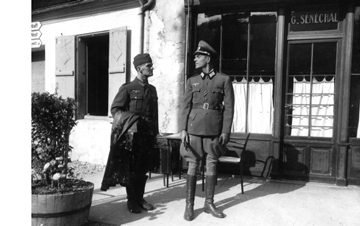
Ebrennac's visit to Paris is an extended series of up angles of him looking at streets, monuments or riding in a car, so that we can't see that Paris has changed. Melville inter-cuts this beautifully with absolutely perfect stock footage filmed by German news cameramen, of Parisian street scenes with the correct signage and vehicles. Young Parisian girls socialize with German soldiers and officers. The footage cuts together perfectly. I'm not certain, but a few shots of Ebrennac in close-up looking at, say, the Arch of Triumph, may have been confected with large photographic blowups, as Melville was known to do for odd scenes in his later movies. It works quite well. Helping considerably is the dramatic music of Edgar Bischoff, which graces the very still scenes instead of looking incongruous. When Ebrennac plays classical music on the Frenchman's piano, the effect is equally dramatic. A good detail is the grandfather clock in the Uncle's sitting room. It has a very loud ticking, the kind that we remember from, well, Grandpa's house. Melville uses it to play up the discomfort Ebrennac feels, being given the cold shoulder by his involuntary hosts. 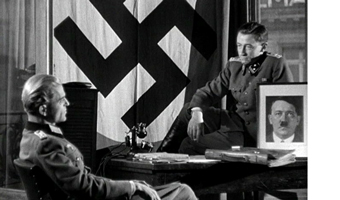
Le Silence de la mer comes from an anti-German book and is an anti-German movie. Ebrennac is sensitive and cultured but is still something of a ghoul. Howard Vernon's face resembles that of Boris Karloff, and his eyes often enhance his cadaverous appearance. No wonder the actor slowly became identified with horror movies. The narration and some of the talk at times seems drawn out, but Melville very strongly achieves his goal: no matter how politely he behaves, this invader is the enemy and will always remain so. Even if the Frenchmen grow to like him personally there can be no friendly contact. Prejudice shows up in a brief scene that Melville doesn't handle very well. Ebrennac's thoughts turn to his admiration of the pretty niece, and he thinks of a romance he had back in Germany. There follows a short flashback encounter in the woods between a younger Ebrennac and a plump blonde fraüein. Her only dialogue express a sadistic desire to torture and crush an insect that's bothering her. It's a rather blanket condemnation of anything German. On the other hand, with the exception of the other officers expressing the chapter and verse of their hateful Nazi philosophy, the ordinary soldiers assisting Ebrennac come off as essentially decent, cheerful guys. 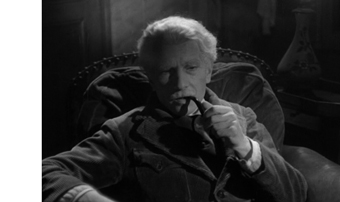
True to the book but also a bit thick is Ebrennac's passive, clearly non-violent personality. It's hard to imagine a German officer in 1941 being this naïve, It's not credible that he would not previously have had contact with his colleagues' ugly opinions. Likewise, Ebrennac is cowed by the Uncle's presence, even when the Frenchman visits him in his own office. The character exists to extol the virtues of French society and art, and then to judge himself harshly. Righteous as it is, the book Le Silence de la mer is nationalistic propaganda for the Resistance. I can only surmise that Melville was in great financial shape. Unable to get Jean Bruller's permission, he felt so strongly about Le Silence de la mer that he filmed the whole thing anyway. He then left it to the author to decide if it was worthy to be shown, or if it should be destroyed. The impressive directorial debut honors its literary source and shows a knowledgeable, thinking filmmaker at work. Melville moved directly to his second feature, Les Enfants terribles, which also stars Nicole Stéphane. The Criterion Collection's Blu-ray of Le Silence de la mer is a perfect scan of this interesting picture, with a glowing B&W image. The film can't have more than a couple of hundred shots, yet we feel we know the road outside the Uncle's house and the small village down the road. All we see of the German army is a single touring car, but we never feel we're being cheated. 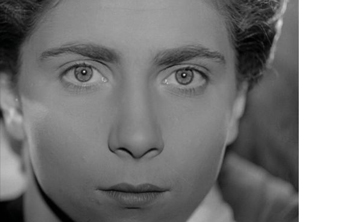
The extras start with Jean-Pierre Melville's 1946 short film 24 Hours in the Life of a Clown, a nostalgic look at a famous circus clown and stage performer. Interestingly, the director uses several cutaways to a man in a trench coat and fedora hat, checking his watch at midnight. The shadow figure could be one of the director's later série noire- style heroes. Two lengthy documentaries bring together some of Melville's collaborators, including actors, writers, relatives and friends. Melville's assistant for several years Volker Schlöndorff corroborates many of the stories about the man. Melville apparently did gamble that author Bruller wouldn't take him up on the promise to destroy the movie, but he laced the screening with a lot of celebrities who would hopefully provide moral support. Scholar Ginette Vincendeau has her own interview piece. All of the participants concur that Melville was a conservative right-wing patriot (which certainly shows in his movies), yet report that he never boasted about his personal role in the Resistance. Geoffrey O'Brian's insert essay acknowledges that Melville thought the film's use of words and images 'anti-cinematic' yet the proper style to honor the book. Almost an entire two chapters of Rui Nogueira's Melville interview book -- required reading back in film school -- fills out the fat insert booklet (not, this time, a folded pamphlet). 
On a scale of Excellent, Good, Fair, and Poor,

The version of this review on the Savant main site has additional images, footnotes and credits information, and may be updated and annotated with reader input and graphics.
Review Staff | About DVD Talk | Newsletter Subscribe | Join DVD Talk Forum |
| ||||||||||||||||||